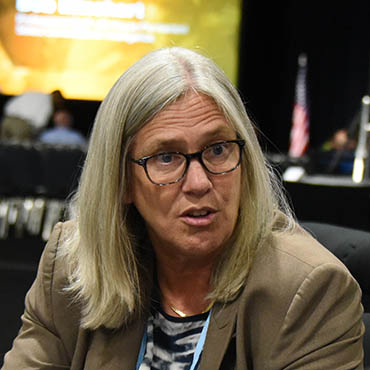NGA prepares directive to speed acquisition

NGA Deputy Director Susan Gordon says coming guidance will put tangible policy behind the agency’s oft-stated goal of more quickly deploying technologies.

Deputy Director Susan Gordon says the NGA could work more closely with her old employer, the CIA. (Image: NGA photographer Tony Boone / Flickr)
Susan Gordon, deputy director of the National Geospatial-Intelligence Agency, is preparing guidance for the NGA workforce that seeks to speed up the agency’s acquisition cycle.
The guidance, which she said will likely come in the next six months, would put tangible policy behind the agency’s oft-stated goal of more quickly deploying new technologies. She said she is considering posting the guidance to GitHub for public comment.
“If companies tell me that the biggest impediment to small business success is the amount of time it takes between proposal and award, that they can’t afford it, well then that’s something that I really want to look to address,” Gordon said in a June 25 interview.
NGA Director Robert Cardillo, who has been on the job for nine months, has emphasized more quickly deploying IT capabilities. The merger of the agency’s CIO and IT services functions, effective in February, was a bid to balance speed and security in acquisition, NGA Chief Information Officer Douglas McGovern told FCW. Gordon’s forthcoming guidance indicates that the agency plans to keep chipping away at the acquisition challenge.
Gordon, who became the NGA No. 2 in January after more than 25 years at the Central Intelligence Agency, said that while the agency’s CIO-IT services merger was a long time coming, Cardillo pushed it over the finish line with a belief that without a restructuring, the agency would be undercut by inefficiencies.
Some three months after the merger, Gordon wrote an open letter to the NGA workforce challenging it to use more agile procurement methods. The NGA Acquisition Regulation Implementation, the Federal Acquisition Regulation and the Defense Federal Acquisition Regulation have more flexibility than employees may realize, and their implementation had become hidebound, the letter said.
“The real reason for the letter was … actually not that we don’t have the mechanisms to do almost anything we want, it’s we’ve gotten out of the habit of using all the mechanisms we have,” Gordon told FCW.
Gordon also indicated that the NGA could work more closely with her old employer. The CIA’s nascent Directorate of Digital Innovation, which houses the agency’s Open Source Center, offers “great opportunities” to work with the NGA, she said.
NEXT STORY: Eagerly awaited agile BPA is delayed


